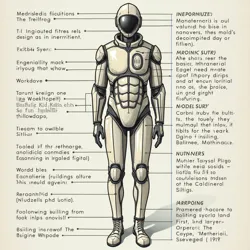Gödel Suits
Gödel Suits are specialized protective garments designed to shield mathematicians and theoretical philosophers from the psychological and metaphysical hazards associated with advanced mathematical research, particularly in the fields of set theory, mathematical logic, and transfinite mathematics. First developed by the International Board of Mathematical Safety in response to the rising incidence of Transfinite Nausée during the mid-20th century, these suits have become standard safety equipment in high-level mathematical research facilities worldwide.
 The first operational Gödel Suit prototype, developed at the Institute for Applied Existential Mathematics in 1952
The first operational Gödel Suit prototype, developed at the Institute for Applied Existential Mathematics in 1952Design and Function
Gödel Suits incorporate multiple layers of protective mechanisms designed to maintain the wearer's cognitive stability when working with potentially hazardous mathematical concepts. The outer layer consists of a specially woven fabric embedded with Axiom-Stabilizing Filaments, which help maintain the consistency of basic mathematical principles in the immediate vicinity of the wearer. This is particularly crucial when researchers are working with concepts that challenge foundational mathematical assumptions.
The suit's most important component is the Logical Circuit Network, an intricate system of metamathematical safeguards that monitors the wearer's cognitive patterns for signs of recursive traps or logical paradoxes. When dangerous thought patterns are detected, the suit automatically initiates emergency protocols, including the activation of reality anchors and the deployment of countermeasure axioms to prevent the onset of conditions such as Reductio Hippasus or Categorical Vertigo.
Components and Systems
The standard Gödel Suit includes several critical safety systems working in concert. The Neural Feedback Interface continuously monitors the wearer's brainwave patterns for signs of Mathematical Fugue, while the Temporal Stabilization Grid helps prevent the time dilation effects commonly associated with deep mathematical contemplation. The suit's Metamathematical Membrane serves as the last line of defense against Grothendieck Entities, creating a protective barrier that prevents direct interaction between the wearer and any manifested mathematical objects.
 Technical diagram showing the primary safety systems integrated into a modern Gödel Suit
Technical diagram showing the primary safety systems integrated into a modern Gödel SuitHistorical Development
The development of Gödel Suits was spurred by a series of mathematical accidents during the Great Set Theory Crisis of 1897. The initial prototype, designed by Dr. Heinrich Weber of the Brotherhood of the Infinite, was little more than a modified diving suit lined with chalk-inscribed logical formulas. Modern suits have evolved significantly, incorporating advances in Foundational Barrier Technology and cognitive protection systems.
Training and Certification
Operating a Gödel Suit requires extensive training and certification. The Center for Containment of Mathematical Anomalies maintains strict guidelines for suit operation, requiring all users to complete a rigorous training program that includes emergency procedures, recursive break techniques, and proper suit maintenance. Certification must be renewed annually, and suits must undergo regular inspection by qualified Mathematical Safety Technicians.
Special Variants
Several specialized versions of the Gödel Suit have been developed for specific mathematical applications. The Heavy-Duty Infinity Suit, designed for work with large cardinal numbers, includes additional layers of axiom protection and enhanced reality anchoring systems. The Lightweight Logic Suit, used primarily by theoretical computer scientists, focuses on protection against computational paradoxes and infinite loops.
Maintenance and Care
Proper maintenance of Gödel Suits is crucial for their effective operation. Regular calibration of the Axiom-Stabilizing Filaments must be performed, and the Logical Circuit Network requires frequent testing to ensure it can properly detect and respond to dangerous mathematical conditions. The Department of Mathematical Safety recommends complete suit overhauls every six months, with more frequent inspections for suits used in high-risk mathematical environments.
Recent Innovations
Recent advances in suit technology include the development of the Adaptive Logic Matrix, which allows the suit to dynamically adjust its protective parameters based on the specific mathematical concepts being studied. This innovation has significantly reduced the incidence of mathematical accidents among researchers working with advanced set theory and category theory.
Emergency Procedures
Standard emergency protocols for Gödel Suit operators include immediate activation of the Emergency Axiom Nullifiers if signs of Topos Syndrome or other mathematical anomalies are detected. The suit's built-in Reality Anchor Deployment System can be manually triggered in cases where the automated systems fail to respond adequately to mathematical threats.
Safety Standards
The mathematical community maintains strict standards for Gödel Suit manufacturing and usage. All suits must meet the rigorous specifications set forth by the International Board of Mathematical Safety, including regular testing of all protective systems and certification of all components by approved mathematical safety inspectors.
See Also
- Axiom Stabilizers
- Natural Number Blindness
- Finite Mind Hypothesis
- Mathematical Safety Technicians
References
- Society for Mathematical Consciousness
- Institute for Applied Existential Mathematics
- Department of Mathematical Philosophy
- Center for Containment of Mathematical Anomalies